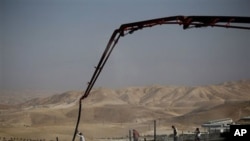The Obama administration said Tuesday it has ended its effort to persuade Israel to renew its moratorium on most West Bank settlement activity in order to restart peace talks with the Palestinians. U.S. officials say the broader effort to achieve a two-state solution to the Middle East conflict will continue.
In a stark admission of failure in a high-priority diplomatic effort, administration officials say the U.S. quest to get a new settlement freeze has ended, and that the United States will pursue other avenues to a peace accord.
In September, U.S. diplomats were able to broker a resumption of direct Israeli-Palestinian peace talks for the first time since 2008. But the talks stalled within a few weeks with the expiration of a 10-month Israeli freeze on most West Bank settlement activity.
The Palestinians had refused to negotiate without a freeze extension.
The Obama administration offered Israel diplomatic incentives and new fighter aircraft to renew the freeze for another three months.
|
Mideast historian Michael Fischbach on the US decision to ease its push for a moratorium on West Bank settlements:
|
But negotiations with Israel over terms for the freeze foundered amid opposition to more settlement curbs from hard-line elements of Israeli Prime Minister Benjamin Netanyahu's coalition government.
Late Tuesday, a State Department official said that after consultations with the parties, the administration has decided that a moratorium extension is not the best basis for resuming direct negotiations.
He said the United States will engage with both sides on the coming weeks and that the U.S. goal of a framework agreement on the core issues of the peace process remains the same.
He said Israeli and Palestinian negotiators are expected in Washington for separate meetings with administration officials next week.
In another development, the State Department expressed its disapproval of a move by South American countries to recognize Palestinian statehood.
Late last week, outgoing Brazilian President Luiz Inacio Lula da Silva said he was taking the step in response to an appeal from Palestinian President Mahmoud Abbas.
Argentina and Uruguay said Monday they are taking similar action.
At a news briefing here, State Department Spokesman P.J. Crowley said unilateral action, in the absence of a peace accord between the parties, is unhelpful.
"We don't think we should be distracted from the fact that the only way to resolve the core issues within the process is through direct negotiations," he said. "That remains our focus. And we do not favor that course of action. As we've said many, many times, any unilateral action, we believe, is counter-productive."
Palestinian officials have recently threatened unilateral moves, including bringing the issue of statehood to the U.N. General Assembly, in the absence of progress in negotiations with Israel.
The step by the South American states also drew critical reaction in the U.S. Congress, from Republican House member Ileana Ros-Lehtinen, who is expected to become House Foreign Affairs Committee Chairman in January.
She said recognizing a Palestinian state, without prior Palestinian commitments to foreswear violence and recognize Israel's right to exist, is misguided and irresponsible, and will embolden others worldwide who use violence to advance their agendas.




